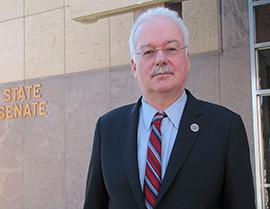Cronkite News has moved to a new home at cronkitenews.azpbs.org. Use this site to search archives from 2011 to May 2015. You can search the new site for current stories.
Legislator proposes do-not-call list for political robocalls
Arizonans who don’t want to be bothered by political phone calls with prerecorded or artificial voices shouldn’t have to be, according to a lawmaker who has proposed a bill to create a do-not-call list for such pitches.
Sen. John Kavanagh, R-Fountain Hills, author of SB 1196, said stopping robocalls to those who don’t want to receive them would be a win-win for voters and politicians because candidates who annoy constituents could lose votes.
“The major purpose of this bill is to provide relief to an annoyed and aggravated segment of the public that is being driven crazy by robocalls,” he said. “It’s in the best interest of these people’s mental health and of the people who send these calls to not give them to the people that despise them and hurt the opinion of the person the call is trying to help.”
As written, the bill would allow voters to place themselves on a do-not-call list through an option on the Arizona secretary of state’s website or through a mail-in document. However, Kavanagh said he supports amending the bill to eliminate the mail-in option and let voters opt out by phone.
The Arizona Secretary of State’s Office would create and maintain the system, which is estimated to cost $50,000 to create and $10,000 per year to maintain.
SB 1196 advanced Feb. 4 on a 5-2 vote by the Senate Government Committee and is awaiting consideration by the Senate Judiciary Committee, which held it Feb. 5 after hearing testimony and is scheduled to take it up again Thursday.
Eric Spencer, state election director for the Secretary of State’s Office, told the Judiciary Committee that political do-not-call lists have led to lawsuits in other states. After the hearing, he said that although Secretary of State Michele Reagan supports SB 1196, there are some legal issues that should be considered.
He pointed to the Telephone Consumer Protection Act of 1991, a federal law that prohibits telemarketing robocalls to residences. It also created the National Do Not Call Registry for citizens to ask to not receive any solicitation calls. The law doesn’t apply to political phone calls.
“I think there’s not yet a consensus on whether or not a law like this is constitutional,” Spencer said. “The most common argument is that a state law like this is preempted because there is a federal law that is on a similar subject, and the argument is if the federal government regulates on something then it doesn’t leave room for the states to supplement it.”
Under SB 1196, the Secretary of State’s Office and Attorney General’s Office would be required to enforce the do-not-call list.
During the hearing, Spencer said he doesn’t expect the Secretary of State’s Office to be able to increase its manpower for this purpose, but he said he doesn’t foresee a problem if all the cases can simply be referred to the Attorney General’s Office.
Sen. Bob Worsley, R-Mesa, said the need for staffing could significantly increase the cost of the bill beyond what the state can afford.
“It might be too expensive for us to take in in this budget crisis,” he said. “I thought (Kavanagh’s) $50,000 number sounded pretty light. You hear the Secretary of State Office saying they will not staff up for this, so there will be a backlog of complaints if no one is going to spend the money to do this right.”
Worsley said SB 1196 addresses only one part of the annoyances that voters have shared with him.
“In talking to the citizens of Mesa, they were irritated with robocalls, they were irritated with live voice calls, they were irritated with polls, and frankly they became very irritated with all the mail, and of course people are irritated with all the signs around town,” he said. “It’s a slippery slope. I don’t know why you justify doing this for just robocalls because they’re somehow more irritating.”
While discussion on the legislation continues, the irritation of robocalls has caused some to look for relief outside of government efforts. Aaron Foss won the Federal Trade Commission’s national Robocall Challenge in 2013 for the best idea to stop robocalls, called Nomorobo.
Nomorobo, a free service, uses a technique called “simultaneous ring,” which uses servers to remotely answer customers’ phones for them if the number is a known robocaller. It currently has about 200,000 users.
Foss said SB 1196 is an excellent way to protect consumers from political robocalls, which he said are more offensive than live calls because of their methodology.
“I think politicians should have to abide by the national do-not-call list, but this is the next best thing,” he said. “The reason the robocalls are looked at differently is because they’re a weapon of mass destruction because they can blast out tens of thousands of calls that no human could do.”
Shaun Dakin, founder of the online National Political Do Not Contact Registry, which is now being absorbed by Nomorobo, testified in the Senate in 2008 about the disadvantages of political robocalls.
He said he doesn’t have high hopes for SB 1196.
“There is typically no real constituency that will keep the pressure on over time to do something about this, and politicians have no incentive to do it,” Dakin said. “It doesn’t matter what year it is, on the Wednesday after election day robocalls stop and the anger stops and the memory stops. They know voters have a short memory and then they wait until the next election and then start all over again.”







